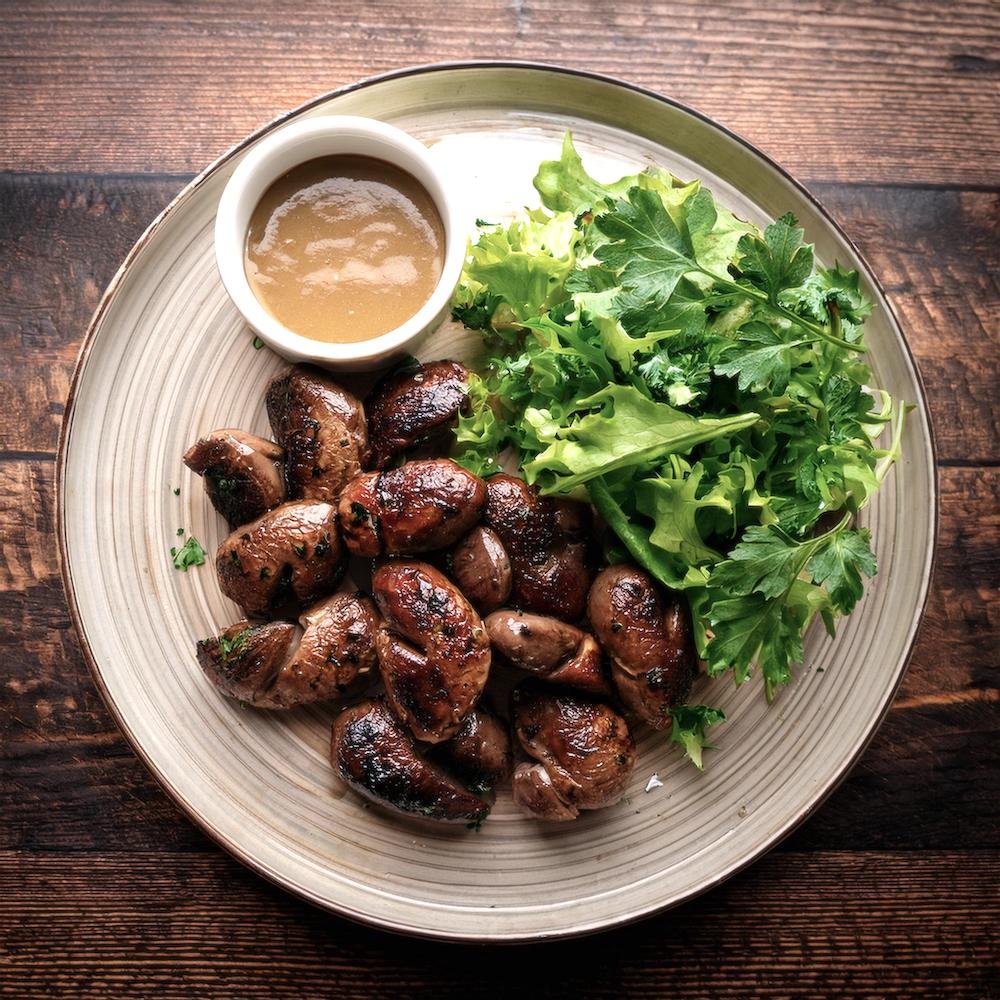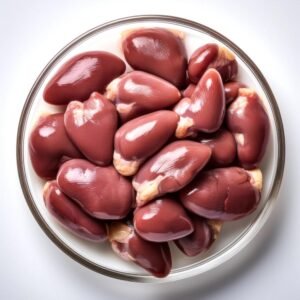Are Chicken Hearts Good for You? are a nutrient-dense and versatile protein source that is often overlooked in modern diets. However, they have been a staple in traditional cuisines worldwide for centuries. Packed with essential vitamins, minerals, and healthy fats, it is not only delicious but also offer numerous health benefits.
In this article, we’ll explore why it is good for you, their nutritional value, and how they can fit into a variety of diets. Whether you’re looking to boost your protein intake or add more diversity to your meals, it is a fantastic choice.
Nutritional Benefits
They are a powerhouse of nutrients, offering a range of health benefits in a small package. Here’s a detailed look at their nutritional profile:
1. High in Protein
- Protein Content: it is an excellent source of high-quality protein, with about 17 grams of protein per 100 grams.
- Why It Matters: Protein is essential for muscle growth, repair, and overall body function, making it a great addition to active and health-conscious diets.
2. Rich in Essential Vitamins and Minerals
Iron
- Helps prevent anemia by supporting red blood cell production.
- Particularly beneficial for individuals with iron deficiencies or high physical activity levels.
Vitamin B12
- Crucial for maintaining healthy nerve function and producing energy.
- it is an excellent source of B12, supporting cognitive health and reducing fatigue.
Zinc
- Boosts immune system function and aids in wound healing.
- Zinc in chicken hearts contributes to maintaining healthy skin and overall well-being.
3. Low in Calories and Carbs
- With only about 130 calories per 100 grams, They are a low-calorie protein source.
- Containing minimal carbohydrates, they are ideal for low-carb, keto, or weight-loss diets.
4. Packed with Heart-Healthy Fats
- While it contain fats, they are primarily unsaturated fats, including omega-6 fatty acids.
- These fats support cardiovascular health when consumed as part of a balanced diet.
5. Nutrient Density for Active Lifestyles
- They provide a concentrated source of nutrients in small portions, making them an excellent option for athletes or individuals needing a quick energy boost.
Health Benefits
Chicken hearts aren’t just nutritious—they offer a range of health benefits that make them a valuable addition to your diet. Here’s how they can positively impact your overall well-being:
1. Supporting Muscle Growth and Repair
- High Protein Content</strong>: Chicken hearts provide the essential amino acids needed for muscle recovery and growth.
- Why It Matters: They’re an excellent protein source for athletes, fitness enthusiasts, and those looking to maintain lean body mass.
2. Boosting Energy Levels and Combating Fatigue
- Rich in Vitamin B12: This essential vitamin plays a key role in energy production and preventing fatigue.
- Iron Content: Iron helps transport oxygen throughout the body, enhancing energy levels and reducing symptoms of anemia.
- Who Benefits: Ideal for individuals with high energy demands, including pregnant women, athletes, and people recovering from illness.
3. Promoting Immune System Health
- Zinc for Immunity</strong>: Chicken hearts are rich in zinc, which helps strengthen the immune system and ward off infections.
- Vitamin B6 Contribution: Found in smaller amounts, vitamin B6 supports the production of antibodies, boosting your body’s defense mechanisms.
4. Maintaining Cardiovascular Health
- Healthy Fats</strong>: Chicken hearts contain unsaturated fats, which support heart health when consumed in moderation.
- Iron’s Role: Adequate iron levels contribute to healthy circulation and reduced risk of cardiovascular complications.
- Potassium Content: Though not as rich as other sources, the potassium in chicken hearts helps regulate blood pressure.
5. Supporting Brain and Nervous System Health
- Vitamin B12: Plays a vital role in maintaining healthy nerve cells and supporting brain function.
- Choline: Present in chicken hearts, choline supports neurotransmitter production and memory enhancement.
6. Ideal for Weight Management
- Low-Calorie Option: With only about 130 calories per 100 grams, chicken hearts are a nutrient-dense food that keeps you full without excess calories.
- Protein Satiety: High protein content promotes satiety, helping reduce overall calorie intake.
Pro Tip: Incorporating Chicken Hearts for Maximum Benefits
To retain the health benefits of chicken hearts:
- Use cooking methods like grilling, stir-frying, or steaming to avoid excess fat.
- Pair with fresh vegetables and whole grains for a balanced meal.
<strong>Are Chicken Hearts Suitable for All Diets?
<p><p>Chicken hearts are highly versatile and can fit into a variety of dietary plans. However, certain factors should be considered depending on individual dietary needs and preferences.
1. Keto and Low-Carb Diets
- Why They’re Ideal</strong>: Chicken hearts are naturally low in carbohydrates and rich in healthy fats and protein, making them an excellent choice for keto and low-carb meal plans.
- How to Use Them: Pair chicken hearts with leafy greens or low-carb vegetables like zucchini and asparagus for a complete keto-friendly meal.
2. High-Protein Diets
- Protein Powerhouse: With about 17 grams of protein per 100 grams, chicken hearts are a fantastic addition to high-protein diets.
- Who Benefits: Athletes, bodybuilders, and individuals looking to increase their protein intake for muscle repair or weight management.
3. Weight-Loss Diets
- Low in Calories: At approximately 130 calories per 100 grams, chicken hearts are a calorie-conscious option for those aiming to lose weight.
- Protein Satiety: The high protein content keeps you fuller for longer, reducing overall calorie intake.
4. Traditional and Balanced Diets
- Nutrient Density</strong>: Chicken hearts provide a range of essential nutrients that complement a balanced diet.
- Cultural Significance: Often used in traditional recipes, they can add variety and nutritional value to meals in many cuisines.
5. Vegan and Vegetarian Considerations
- Not Suitable</strong>: Chicken hearts are not suitable for vegan or vegetarian diets. However, plant-based alternatives like tofu or seitan can mimic the texture in certain recipes.
- Nutritional Alternatives: For nutrients like iron and B12, vegans and vegetarians can opt for fortified foods or supplements.
6. Cholesterol Considerations
- Moderation is Key</strong>: Chicken hearts are relatively high in cholesterol, with about 242 mg per 100 grams. While dietary cholesterol has less impact on blood cholesterol than previously thought, those with cholesterol concerns should consume them in moderation.
- Balancing Act: Pair chicken hearts with fiber-rich vegetables and avoid excessive saturated fats to maintain heart health.
Pro Tip: Dietary Adaptability</strong>
-
- <li
>Chicken heart
-
- s can be easily incorporated into most diets with the right preparation. For lighter meals, grill or braise them with minimal oil, and for
richer dishes,
- include them in stews or stir-fries.
How to Incorporate Chicken Hearts into Your Diet

<p><p>Chicken hearts are versatile and easy to cook, making them an excellent addition to various meals. Here are some practical ways to include them in your diet while retaining their nutritional benefits.
1. Cooking Methods That Retain Nutrients
Grilling
- Ideal for creating flavorful skewers, such as Brazilian-style or Japanese yakitori.
- Use a simple marinade of olive oil, garlic, and spices to enhance their natural flavor.
Stir-Frying</h4>
Quickly cook chicken hearts in a hot skillet with vegetables and a light sauce.
- Stir-frying preserves nutrients while delivering a delicious and fast meal.
Braising</strong>
<ul>
- Simmer chicken hearts in a savory broth or sauce for a tender and flavorful dish.
- Add aromatic ingredients like onions, garlic, and herbs for depth.
Roasting</strong>
<ul>
- Roast chicken hearts in the oven with your favorite spices for a crispy exterior and tender inside.
- Serve them as a main course or as a protein-rich appetizer.
2. Popular Recipes and Meal Ideas

Grilled Chicken Heart Skewers
- Thre
ad marinated chicken hearts onto skewers and grill until charred and juicy.
- Serve with a side of chimichurri or a light salad.
Chicken Heart Stir-Fry</strong>
- Combine chicken heart with colorful vegetables like bell peppers and snap peas.
- Add a tangy sauce made from soy sauce, ginger, and garlic for a quick, healthy dinner.
Hearty Chicken Heart Stew</strong>
- Include chicken heart in a hearty stew with root vegetables like carrots and potatoes.
- Simmer in a flavorful broth for a comforting and nutrient-packed meal.</li>
- Coat chicken hearts in a seasoned flour mixture and fry until crispy.
- Enjoy as a snack or appetizer with a dipping sauce like ranch or hot sauce.</ul>
3. Pairing Chicken Heart with Complementary Ingredients
- Leafy Greens: Serve it with a side of spinach, kale, or arugula for a nutrient boost.
- Whole Grains: Pair with quinoa, brown rice, or farro for a balanced meal.
- Bold Spices and Sauces: Use spices like smoked paprika, cumin, or turmeric to enhance their flavor. Pair with sauces like tzatziki, tahini, or spicy Sriracha.
- Seasonal Vegetables: Incorporate seasonal produce to add variety and freshness to your dishes.
4. Meal Prep Ideas
- Cook it in bulk and use them throughout the week in salads, wraps, or grain bowls.
- Store cooked it in airtight containers in the refrigerator for up to 3 days.
Pro Tip: Experiment with Global Flavors
They are used in many cuisines worldwide. Try adding them to Brazilian churrasco, Japanese yakitori, or Southeast Asian stir-fries to explore their full culinary potential.
Frequently Asked Questions (FAQs)
Is chicken heart good or bad for you?
They are good for you when consumed in moderation as part of a balanced diet. They are:
Rich in Protein: Essential for muscle growth and repair.
Packed with Nutrients: High in iron, zinc, and vitamin B12, supporting energy levels, immunity, and nerve health.
Low in Calories: Ideal for weight management and low-carb diets.
However, they are relatively high in cholesterol, so individuals with cholesterol concerns should limit their intake and consult a healthcare provider.
Are chicken hearts healthier than breasts?
Both chicken hearts and chicken breasts offer health benefits but differ in their nutritional profiles:
Chicken Hearts: Packed with micronutrients like iron, zinc, and vitamin B12, chicken hearts are an excellent source of essential minerals and vitamins. They also contain healthy fats, providing a rich energy source.
Chicken Breasts: Known for being lean, chicken breasts are lower in cholesterol and calories, making them a popular choice for weight management.
Can you eat too much chicken hearts?
Yes, eating too many chicken hearts can have drawbacks:
High Cholesterol: They are relatively high in dietary cholesterol, which can contribute to elevated blood cholesterol levels in sensitive individuals.
Overeating Organ Meats: Consuming large quantities of organ meats regularly may lead to an excess of certain nutrients, such as iron or vitamin A.
Are chicken hearts a superfood?
While not officially classified as a superfood, They are often considered one due to their nutrient density:
Nutrient Powerhouse: High in protein, iron, zinc, and vitamin B12.
Low-Calorie and Low-Carb: Ideal for weight loss and low-carb diets.
Sustainability: Their inclusion in “nose-to-tail” eating promotes sustainable food practices.
They are an excellent addition to a healthy diet, offering concentrated nutrients that can support overall well-being.
Suggested Internal Links:
- What Does a Chicken Heart Taste Like?
Explore the unique flavor profile of chicken heart and how they are prepared. - Do Chicken Hearts Need to Be Cleaned?
Learn essential cleaning tips to prepare chicken hearts for cooking. - Are Chicken Hearts Gizzards?
Understand the differences between chicken hearts and gizzards. - What Does Tarragon Taste Like in Chicken?
Discover how tarragon pairs with chicken hearts for a flavorful dish. - Chicken Hearts
Dive deeper into recipes and nutritional insights about chicken hearts.
Conclusion

Chicken hearts are a highly nutritious and versatile ingredient that deserves a place in your diet. Packed with protein, vitamins, and minerals, they offer numerous health benefits, including supporting muscle growth, boosting energy, and promoting heart health. While they are richer in cholesterol compared to lean meats, enjoying them in moderation as part of a balanced diet can be incredibly beneficial.
Whether you’re looking for a nutrient-dense protein source, exploring global cuisines, or simply trying something new, They are a fantastic choice. With countless recipes and cooking methods to try, they provide an exciting and healthy addition to your meals. Now is the perfect time to give them a go and share your culinary creations with family and friends!
Discover more mouthwatering recipes on our Web Site ! Stay connected and get inspired by following us on Facebook, Instagram, Pinterest, and Twitter for the latest updates!

